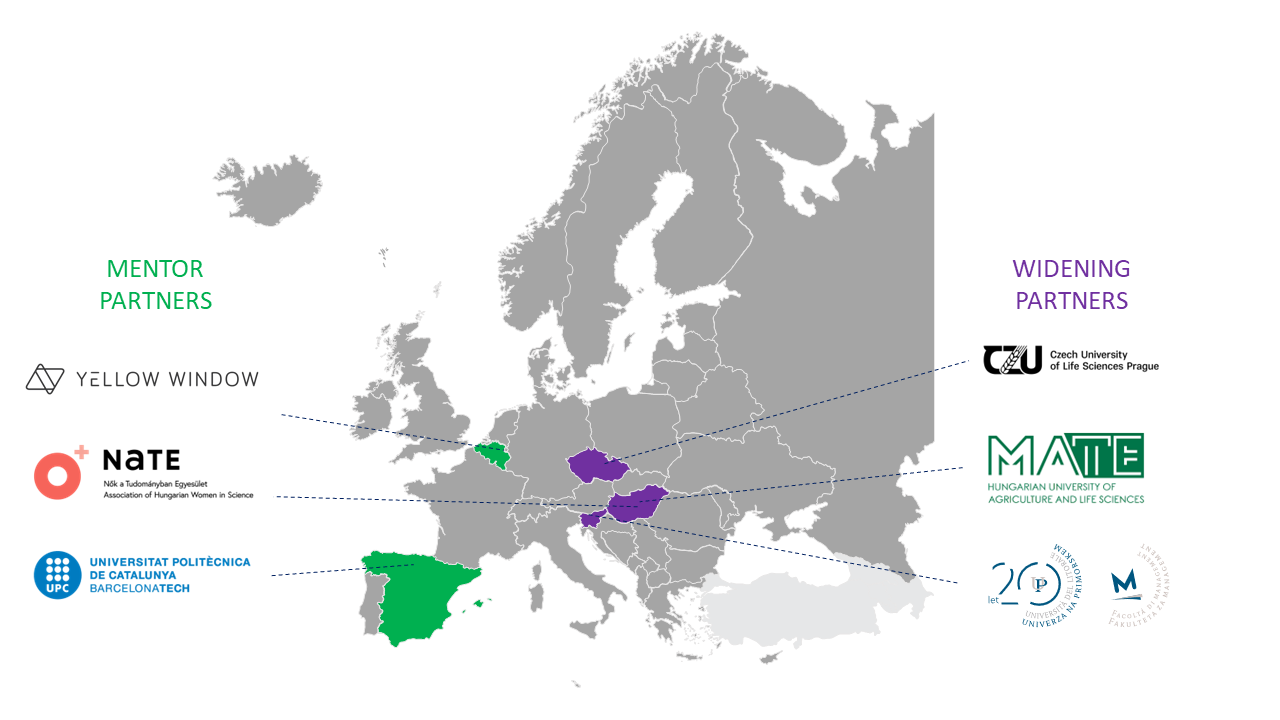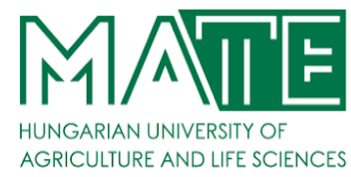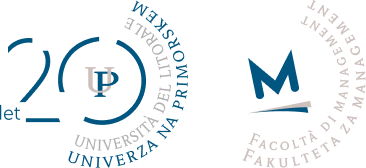Hungarian University of Agriculture
and Life Sciences (MATE)
Julianna Kobolak
info@agrigep.eu
The Hungarian University of Agriculture and Life Sciences (MATE) is the largest agriculture and environmental science-oriented higher education organization in Hungary, founded in 2021. Its legal predecessor was Szent István University, with decades-long existence. The University offers more than 50 diploma and degree courses as well as 52 MSc programs with a total of over 13000 students, and 14 Doctoral Schools with 756 PhD students.
The highly qualified educational and research faculties established a comprehensive integration of education, research, and development in the new intellectual and innovation centre of agriculture and applied life sciences. The institution intends to take lessons learned from the most successful European universities so that tradition and the innovations of the modern age will be integrated as a whole. The backbone of the new university infrastructure is provided by 20 Institutes, on 5 campuses. MATE’s long-term objective is to be amongst the thirty best agricultural higher education universities in the world while being the flagship of Hungarian agricultural education. As one of the largest agricultural-oriented, multidisciplinary, tertiary institutions in Central Europe, MATE’s mission is to provide a world-class education that offers our alumni a promising career and makes them competitive in the job market.
MATE developed its first GEP in 2021. The document provides an overview of the actual status of GE at the MATE, considering different aspects, including employees and students; identifies the needs and measures which should be determined during the implementation period, and finally envisage an action plan to promote progress towards the proposed goals. The document es the commitment of MATE to implement the program and increase GE in the organisation and achieve progress at each key priority area.

Czech University of Life Sciences (CZU) is a leading educational and research centre in the Czech Republic. It encompasses more than one hundred years of tradition with the newest technologies, progressive science, and research activities in agriculture, forestry, bioeconomy and biotechnologies, landscape architecture, environment, food, wood sciences, economics and business, management, ICT, rural development, mechanical engineering, and pedagogy.
The University is a member of the EuroLeague for Life Sciences (ELLS), Union of Forest Research Organisations (IUFRO), Interuniversity Consortium for Agricultural and Related Sciences in Europe (ICA), Conference of Deans and Directors of European Forestry Faculties and Schools (ConDDFFES) and many other alliances. Having participated in a plethora of EU-funded and national projects, CZU has the know-how on leading and coordinating a project of this magnitude. In 2021, CZU was awarded the HR Excellence in Research (HR Award17) by the European Commission. The CZU adheres to the rules set out in the Charter and the Code in the area of recruitment and employment of their staff. In 2021, CZU also adopted the GEP which expresses the CZU commitment to address gender mainstreaming and equal gender opportunities in a systematic and long-term manner, which was published on its website18. Transparent and equal access to employees is one of the important elements of strategic human resources management which is covered by CZU’s 2021+ Strategic Plan for Educational, Creative and Other Activities, where GE is one of the specific objectives.

University of Primorska (UP) was established in 2003 as a third public university in Slovenia. It consists of 6 Faculties, 1 Research Institute, 1 Student Residence and the University Library. The vision of UP is in building and consolidating its position through its scientific research, educational and artistic activities and its commitment to the local and wider society, as a respected and excellent university in the global academic arena.
UP is achieving high quality, inclusive, and sustainable scientific, educational and artistic work in harmony with strategy Society 2050 with the principles of participatory science and the balance of humanities, social sciences and arts with natural sciences and (bio)technology. Its main goals and aims are written in the Mid-Term Development Strategy of UP 2021–2027, which contains guidelines for ten interrelated pillars, including scientific research and pedagogical excellence, advancement and updating of innovative study programs, cooperation with society and industry, as well as with other knowledge users nationwide and internationally. Special emphasis is also placed on the staff structure and ensuring a mechanism to maintain quality in all areas, and on innovation and intellectual property, as well as on the international recognition of UP in the global network of universities and on internationalization at home.

Universitat Politècnica de Catalunya BarcelonaTech (UPC) is a public institution of research and higher education in the fields of engineering, architecture, sciences and technology. The university offers more than 66 diploma and degree courses, 81 MSC courses and 45 PhD Programmes among its 9 campuses.
Every year, UPC hosts more than 6,000 bachelor’s and master’s students and more than 500 doctoral students (academic year 2018-2019) with a high graduate employment rate: 93% of its graduates are employed. The UPC has a specialised unit that is dedicated to the contractual, legal, and financial aspects of European Research projects called the International Projects Unit (UPI), which also helps with the preparation and submission of proposals. The UPI has wide-ranging management experience dating back to the Fifth Framework Programme (1998-2002). Under the Horizon 2020 programme (2014-2020), the UPC was granted 243 projects, of which it has coordinated 66 (13 of them are funded by the European Research Council). The UPC also has 53 projects (of which it coordinates 9) funded by other European programmes. All of these projects have received a total of EU financial contributions of EUR 98.4 million. Regarding the current Horizon Europe Programme, UPC has been awarded 13 projects, significantly, 2 as a coordinator and 2 ERC Starting Grants, with a total funding of 9.76 million. The UPC is an International Campus of Excellence with two projects: the Barcelona Knowledge Campus (BKC) and the Energy Campus. Through these projects, it promotes employability, social cohesion, and regional economic development. It interacts with research centres, science and technology parks, businesses and other agents as a hub for attracting talent in emerging research areas. In addition, through its four UNESCO Chairs, the UPC contributes to the exchange of knowledge and fosters cooperation. Since 2013 the UPC has endorsed the European Commission’s European Charter and Code for Researchers, two documents, addressed to researchers as well as research employers and funders in both the public and private sectors, are key elements in the EU's policy to boost researchers' careers. Moreover, in the context of the Human Resources Strategy for Researchers (HRS4R), which supports the Charter, the UPC obtained (in July 2017) an official acknowledgment for HR Excellence in Research and was granted the certified logo of the programme by the European Commission. With reference to the GE Policy, UPC is currently working on the implementation of its Fourth Gender Equal Opportunities Plan (2022-2026) through the Equal Opportunities Office, which was created in 2007. From 2017 to 2021 the UPC was involved in the GEECCO project (Gender Equality in Engineering through Communication and Commitment), which aimed to reduce gender inequality in European research institutions working in STEM fields.

Association for Hungarian Women in Science (NaTE) is a leading Hungarian NGO promoting gender equality (GE) in the field of R&I in Hungary. NaTE has a wide experience through national and international projects, processes of social innovation and network building, as well as in conducting both quantitative and qualitative research and also in delivering GE trainings.
NaTE has a considerable national network consisting of scientists, teachers, research managers and students, as well as a multi-stakeholder network comprising industrial, academic, governmental organizations, and NGOs. NaTE implemented the international Girls’ Day initiative in Hungary and has been running in partnership with industrial partners. The Association has a country-wide Ambassador Network of female high school and university students, who are the flag bearers of the “women in science” initiative among the young generation. NaTE founded and is managing the national Women in Science Excellence Award, which is supported by the Hungarian Academy of Sciences and the UNESCO. NaTE has participated in different international projects and programs, such as H2020 (EFFORTI, CARERA, FAWORIT), CSI-COP, Visegrad Fund (V4 Girls’ Day, V4 STEM Camp), and has conducted several projects funded by foreign entities (US Embassy, Association of American University Women) or international companies (ALCOA, Morgan-Stanley); all aimed at attracting girls and women to STEM professions. The Association is a member organization of the European Platform of Women Scientists (EPWS) and is the local National Contact Point of the European Centre for Women and Technology (ECWT).

Yellow Window is a multi‐disciplinary consultancy specializing in product, service and policy design, with considerable expertise in the fields of gender equality and social innovation. They have extensive experience in designing research methodologies, collecting and analysing complex and comprehensive data, drafting thorough and accessible reports communicating the research findings, and translating them into concrete (policy) recommendations.
As a facilitator and ‘gender expertise provider’, YW has been a partner in four structural change projects aiming at GEP design and implementation (GEECCO, SUPERA, GEARING-Roles and Gender-SMART), and was the scientific coordinator of the GE Academy. YW has a track record in developing tools and instruments for capacity building and training activities combined with enabling and facilitating institutional change through gender mainstreaming. In all its assignments, YW deploys participatory and co-creation techniques.
